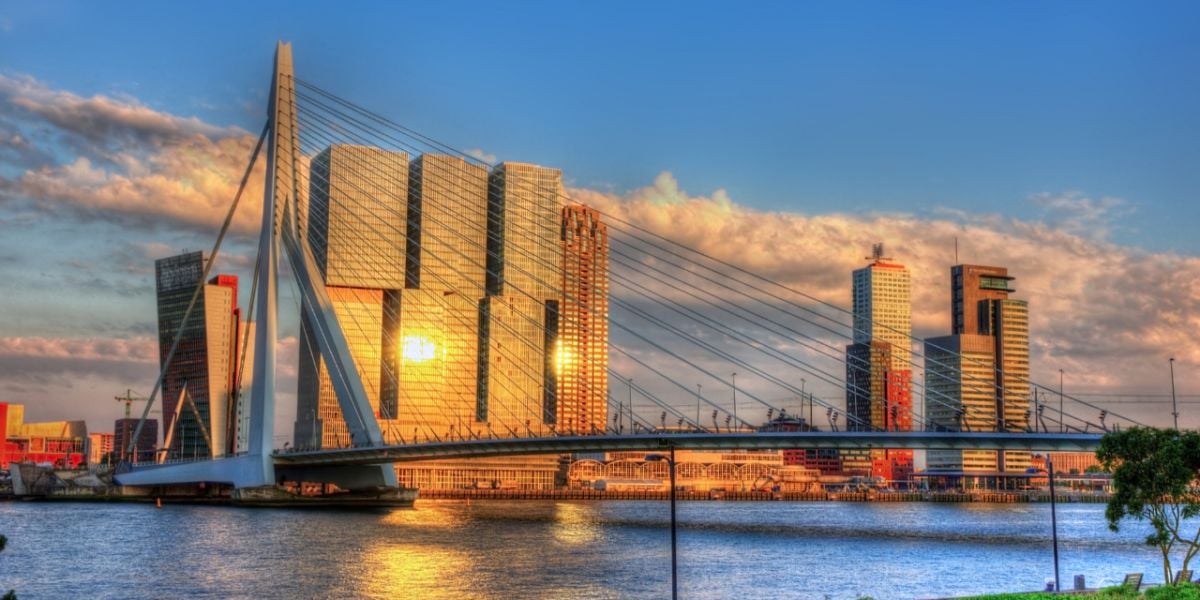
While most other parts of the Netherlands feature centuries-old architecture, Rotterdam looks like a modern American city; this is the result of reconstruction after the destruction of World War II.
You may be drawn to this port city because of its modern look or maybe because it's one of the largest port cities in the world. So what are the working conditions like? Keep reading to find out more about the local economy and where to look for work in Rotterdam.
The economy of Rotterdam
Before the pandemic hit in 2020, most larger Dutch cities (such as Amsterdam and Utrecht) had service-focused economies. While Rotterdam was certainly going in that direction as well, this city's economy wasn't as focused on business and consumer services. As a result, the pandemic didn't affect Rotterdam as badly as other cities, as the service sector isn't huge here.
Considering it's home to one of the biggest ports in the world, you shouldn't be too worried about the economy crashing there, as in 2024, 3.2% (or €30.6 billion) of the Dutch GDP is from the port of Rotterdam. Also, while the pandemic certainly had an impact on the city's port economy (there was a dip in 2020), it quickly recovered in 2021. There was 7.8% growth in TEU and 4.0% in tons in the first nine months of 2021. In fact, volumes were higher than they were in 2019. Despite Brexit finally going through in 2021 as well, both Q2 and Q3 in 2021 had high demands and volumes from the UK, which actually put the levels above both pre-Brexit and pandemic levels. This is a testament to just how strong the port economy is in Rotterdam.
Do note that in 2023, the Netherlands experienced a mild recession. However, as of mid-2024, it seems to be over.
Where to look for a job in Rotterdam?
As practically anywhere else in the world, the best place to look for a job in Rotterdam is through the internet. Try websites like Monsterboard, Indeed, and LinkedIn. These are job websites where you can search for vacancies in Rotterdam or elsewhere if you don't mind the commute.
Because Rotterdam has a huge port, you should focus on the shipping and trade industries when looking for a job.
How to use LinkedIn
LinkedIn is perhaps the most powerful platform to use when it comes to looking for jobs. Dutch headhunters will use LinkedIn to seek out potential employees, so it's definitely worth your time to create an account.
Make sure you choose a professional profile picture that represents you in the best way possible. If you don't have a suitable picture, then get dressed in office clothing and take a clear and bright picture against a white background, such as your wall.
You should also fill out your profile completely. Emphasize your education and work experience, detailing the duties and responsibilities you had. It's a good idea to also go over the skills you've learned in both areas.
Try to add as many contacts as you can, even if they're not located in Rotterdam, much less the Netherlands. You never know who's in their social network, and the bigger yours is, the better chances you have of finding a job in this city.
Take the time to upload a proper resume too. This will allow you to use the job search feature and attach your CV easily when you want to apply for jobs. While you can certainly wait for headhunters to approach you with opportunities, you can also take a look around at the postings on LinkedIn. In fact, you can even set up job alerts so you know when something relevant comes up.
In addition to the job search function, LinkedIn also offers many resources that'll make pursuing a career easier. Check out the features such as interview prep, and talent pool reports. Fully utilize these things to make interviewing a breeze and ensure you get decent pay.
Use word of mouth
Word of mouth is an old but trusted way of discovering job opportunities. Setting up a LinkedIn account will help immensely with that, but you can also network in person as well.
Think about people who are either currently in the Netherlands, have been there before, or may have connections in the country. They may be able to put you in touch with people who are in charge of hiring or are working at companies that need more people. When you have a connection to a company, that'll usually fare better than just responding to job postings, as these people can either indirectly or directly vouch for you.
Attend job fairs
If you're lucky enough to be in the country already, then it'll be beneficial to attend job fairs and career workshops. Not only can you browse interesting opportunities, but you can also network at these events too. While a company may not have an opening now, you can make connections and check in occasionally to see if they've got a position for you. And if you hit it off with the employee at the booth, they may even contact you directly if something relevant comes up!
Contact companies directly
It wouldn't hurt to browse company websites in Rotterdam to see what's available. Often, there are positions listed on there before they're listed on other sites, if at all.
If you don't find anything relevant for you, don't give up hope just yet. Many companies will invite job seekers to contact them if they feel there's a position that'd be useful there and they can fill. So reach out, and you never know if they'll create a position just for you. Even if they don't, the companies may keep your CV on file; being proactive and approaching them first is impressive to the Dutch.
Which are the most promising fields for expats in Rotterdam?
As of 2023, the port of Rotterdam employs around 180,000 people, and it's projected that it'll create an additional 10,000 jobs by 2030. Currently, it makes up almost 20% of the entire workforce in the region.
While you may think the shipping and trade industries only have hard labor jobs available, this isn't the case anymore nowadays. Because technology's made leaps and bounds with automation and robotics, a lot of these menial tasks are now given to AI and machinery.
Some promising fields for expats in Rotterdam are energy, chemicals, food, and logistics. Rotterdam is home to a few major energy companies, as well as some raw materials for the petrochemical industry. This enables the port to ship raw materials all over Europe easily. Thanks to the abundant farmland in the Netherlands, the port is also able to export fruits and vegetables.
Logistics as a promising field for expats shouldn't come as a surprise. With so much shipping happening in Rotterdam, they need a significant amount of workers to help keep track of what goes where.
Retail is also a rich industry in Rotterdam. It should be relatively easy to find jobs in comparison to other fields. If you're interested in welfare and healthcare in Rotterdam, then you'll be pleased to know that these are flourishing industries as well.
Perhaps you're an academic and wish to teach in the city. The good news is, these are potentially rewarding careers, as you'll find the Rotterdam University of Applied Sciences and Erasmus University Rotterdam here. There are also many other top universities in this city, so it may not be so difficult to find jobs in academia.
The unemployment rate in Rotterdam
Even though the Netherlands has a low unemployment rate that hovers around 3% to 4%, Rotterdam has consistently had the highest rate in the whole country. Between March and August 2020, the country's unemployment rate rose from 2.9% to 4.6%, thanks to the pandemic. However, it steadily declined after that, which is good news. As of May 2024, the unemployment rate was 3.6% of the labor force, which is relatively unchanged since summer 2023.
Because the city has a high unemployment rate, this means it'll be much more difficult to look for a job in Rotterdam than elsewhere in the country. It'll also be doubly hard to find a job if you don't speak Dutch, as this city only receives a tenth of the tourists Amsterdam does. This means Rotterdam's service industry isn't as accommodating for English speakers as it is up north. However, it won't count that much against you if you don't know Dutch, as Rotterdam is a melting pot, after all. You just might not have a leg up on the fierce competition if you don't know the native language.
Plus, if you're a non-EU citizen, companies need to show that they're unable to hire within the EU before they're allowed to hire non-EU employees. With all these factors stacking up, it can be challenging to find a career in Rotterdam.
Wages in Rotterdam
Wages are set by the government, which means they should be the same across the board. If you're over 21 years of age, then you'll receive at least €13.27 per hour. As of 1 January 2024, there's only a set hourly minimum wage; prior to this date, there were minimum monthly and weekly wages.
Considering the national average for wages is just under €47,000 for adults over 18, wages in Rotterdam are decent. The average in this city is €48,000, so if you manage to find a job here, you'll usually be rewarded.
The work culture in Rotterdam
It's true that Rotterdam's a diverse and international city, so depending on the company you work for, you might find a workplace culture that you're used to. However, you should expect the majority of companies to function with mostly Dutch work culture. What does this mean?
For one, it's very important to be on time. Punctuality is highly valued in all areas of life, both during and outside of work. Make sure you arrive early for things like meetings and just your shifts in general.
Also, the Dutch are very honest and direct people, so you may not be used to this at first. You'll find that meetings will have very little small talk, and they'll delve right into the issues at hand. It may initially be jarring, but you'll find that it's very efficient.
What's excellent about the Dutch workplace is there's an emphasis on teamwork and collaboration. In most cases, your opinion will be valued and taken into consideration, so you'll feel like an appreciated employee of the company.
Most workplaces have a smart casual business dress code, but it'll depend on what industry you're in and what position you hold. It's not uncommon to see casual dress in startups, and it's mostly acceptable to have visible piercings and tattoos while at work.
The Dutch aren't overly emotional at work, so you should follow suit. Don't over-exaggerate your language either, and try to keep hand gestures at a minimum.
While most Dutch people are private and separate their business and personal lives, it's becoming more common to socialize after work at events called "borrels". These usually happen after work on Fridays, and coworkers will indulge in borrelhapjes (small snack foods often served at bars) and beers while chatting with one another. This can either happen at the workplace or at a nearby bar.
Your rights as an employee in Rotterdam
It's mandated by law that full-time employees get at least 20 paid days off and 8% holiday pay. So expect many companies to offer more than just the bare minimum.
For example, it's common to find employment packages that help with transportation costs and children's school fees. If you need to commute to work, your employer can reimburse you €0.23 per kilometer, with a maximum of 214 working days as a full-time employee. If you travel to work less than 5 days per week but still do it for at least 128 days a year, your travel allowance will still be calculated in the same way as someone who travels 214 working days.
We do our best to provide accurate and up to date information. However, if you have noticed any inaccuracies in this article, please let us know in the comments section below.








